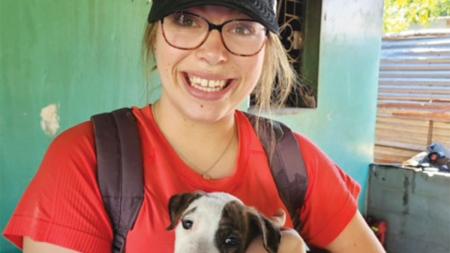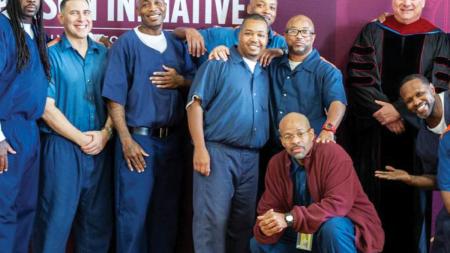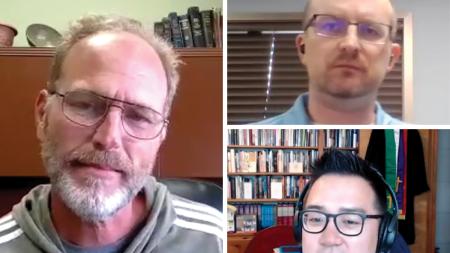Confronting the Doctrine of Discovery

Synod 2016 delegates participate in Blanket Exercise.
June 13, 2016 -- Harry Descheene, Jr. had never heard of the Doctrine of Discovery until he participated in the Blanket Exercise in late April at Rehoboth Christian Reformed Church.
But a light came on when the Navajo man learned about the doctrine that white Europeans used as a justification for removing Indigenous people from their ancestral lands in North America.
In some ways, he said, he had lived aspects of the doctrine first hand, having to leave his home on the Navajo reservation in New Mexico to be enrolled as a first grader in the CRC-operated boarding school at the Rehoboth Christian School in Rehoboth. N.M.
There he had to have his hair cut, was required to wear certain clothing, and told he could no longer use his native language, Descheene said, before helping to facilitate the Blanket Exercise for delegates to Synod 2016.
“I never heard about the Doctrine of Discovery until I went through the exercise, but it made a lot of sense to me,” he said.
After participating in the exercise in Rehoboth, he was asked to join other Native Americans in leading synod delegates through the exercise, which helps people to understand the historical framework of the Doctrine of Discovery.
Delegates to synod will be discussing a study committee report on the doctrine later this week.
“I wanted to come to Grand Rapids and see this city. I wanted to see where all of those Dutch people who taught us at Rehoboth came from,” Descheene said with a smile.
He also said he hopes to visit the grave of a Grand Rapids woman who helped to make his life at the boarding school more pleasant. “She was like a mother to me. She took care of me,” he said.
Although the boarding school no longer exists, the school itself is still open.
Normally, the CRC offers separate Blanket Exercises in the United States and Canada and gear the exercises to the experience of people in those countries. But the exercise for synod focused on both countries.
At Calvin, the Blanket Exercise involved participants standing barefoot or in stockinged feet on blankets arranged on the floor and moving across them as Descheene and others read from a script.
The goal was for participants to get some insight into history as they moved around the blankets and then were asked to step off as various parts of that history were described.
“These blankets represent what we now know as North America, before the arrival of Europeans,” the narration began, addressing those on the blankets.
“You represent the Indigenous people, the people who have been here for at least 10,000 years. Long before the arrival of Europeans, Turtle Island, as it was called by some of the Indigenous peoples, was your home, and home to millions of people like you.”
Narrators spoke about the various edicts and documents that came out “with the intention of giving to Spain, England and Portugal the right to discover, to conquer and convert the pagans to Christianity.”
Descheene said he lived a hard life after leaving Rehoboth. He drank too much and got into trouble. He doesn’t necessarily blame his time in the boarding school for his actions, he said, but the experience of attending the school did help to shape him.
“I worked as a steelworker and traveled all over the country. There were times I thought I was going to die, but I didn’t. The Lord was always there,” he said.
Four years ago, the 58-year-old accepted God and began going to Bethel CRC in Shiprock, N.M. It was there that he learned about the Blanket Exercise taking place at Rehoboth CRC and decided to attend.
During the exercise in the fieldhouse, participants stepped off the blankets as the narrators spoke of epidemics that wiped out Indigenous people, wars that destroyed tribes, and efforts to relocate Native Americans to reservations and preserves.
The narration also discussed efforts in recent years to bring reconciliation and healing between white Europeans and Native Americans/First Nations people.
Afterward, delegates had the chance to meet in rooms in the Covenant Fine Arts Center to discuss their reactions to the exercise.
In the session that Descheene helped to facilitate, reactions were varied. People talked of how hard it would be to have their families removed from their homes. They discussed how similar kinds of disruptions have happened to other groups, including African Americans who were taken from Africa to be slaves in the United States.
One man talked about how the love of Christ is the only thing that can help him deal with thinking about all of the pain and disruption that others have experienced.
Another man commented, after the debriefing session, that he thought the Blanket Exercise didn’t tell the whole story and portrayed white people unfairly.
Descheene said the Doctrine of Discovery, as he’s coming to see it, is part of the long movement of history. It doesn’t explain everything, he said, but it helps to explain some important things—and has put his past into perspective.


